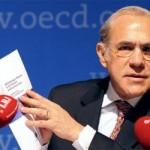
By Angel Gurría, Secretary General of OCDE
For some time now, the global education and economic landscapes have been in a state of rapid transformation, spurred in significant part by two key changes.
The first is the continued ascent of the knowledge economy, which has created powerful new incentives for people to build their skills through education – and for countries to help them do so.
The second phenomenon – closely related to the first – is the explosive growth of higher education worldwide, which has increased opportunities for millions and is expanding the global talent pool of highly educated individuals.
This year’s Education at a Glance examines these landscapes in the light of another important change: the full onset of the global recession in 2009 and 2010.
As one might expect, our analysis finds that no group or country – no matter how well educated – is totally immune from the effects of a worldwide economic downturn. At the same time, it also shows the remarkable importance of having a higher level of education for the economy, for the labour market and for the society as a whole.
Education linked to employment
At the most basic level, it’s clear that having more education helped people to keep or change their jobs during the recession.
For instance, between the start of the downturn in 2008 and 2010, overall unemployment rates jumped from an already high 8.8% to 12.5% for people without an upper secondary education, and from 4.9% to 7.6% for people with an upper secondary education, on average across OECD countries.
By contrast, unemployment rates for people with higher education remained much lower, rising from 3.3% to 4.7% during this same period.
While the rate of change between the two groups may be similar, its impact on labour markets is hugely different. For all OECD countries together, the unemployment rate in 2010 was roughly a third less for men with higher education than for men with upper secondary education; for women with higher education, it was two-fifths less.
Higher education and earnings
The gaps in earnings between people with higher education and those with lower levels of education not only remained substantial during the global recession, but grew even wider.
In 2008, a man with higher education could expect to earn 58% more than his counterpart with no more than an upper secondary education, on average across OECD countries. By 2010, this premium had increased to 67%.
Similarly, in 2008, women with higher education had an average earnings premium of 54% compared to their upper secondary-educated peers. By 2010, this premium had grown to 59%. Leer más…
